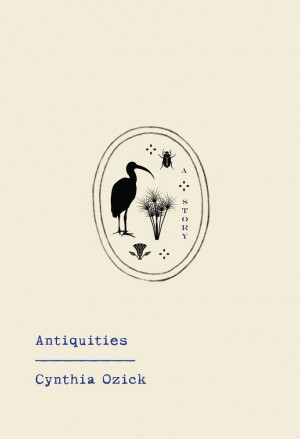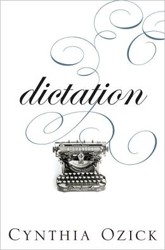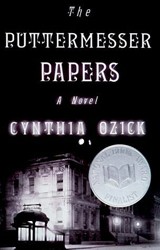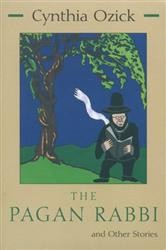Cynthia Ozick is on email now. She wasn’t when I reviewed her previous book, A Din in the Head, an essay collection, for this publication four years ago.
This book feels more modern, speeded up, Henry James for the Twitter era. What I mean by that, less glibly, is that this book feels different from Ozick’s other novels, most noticeable in its format. The story is told in a series of letters between characters, as well as episodes describing their activities in Paris, New York, and California. Ozick’s choice of locales is purposeful, to represent poles of Europe and of America.
The Europe of her setting is not the glamorous, art-filled Europe that Henry James experienced in contrast to the sense James had of American as a cultural backwater. The Europe that Ozick’s American characters escape to is one that is in recovery from the horrors of the Shoah, rather than a place of artistic greatness.
Part of the book’s plot concerns a composer’s journey from being a hack writing for the movies to one whose music will convey serious matters. Leo married Bea because “she was the single mortal on earth who had expected him to write symphonies.” Though she is a nightingale (her last name) with the ear of a crow, she rejected him, but he finally gave her the gift of his music, the “thing she had hoped for long ago.” The irony is that the great music is composed in California by a man known for his compositions for children’s cartoons.
The book’s conclusion is when a character says, “How hard it is to change one’s life.” The corollary, “And how terrifyingly simple to change the lives of others.” Ozick’s wonderful novel again demonstrates the power of a gifted author to let us in to the changes characters make in one another’s lives.
Interview
Cynthia Ozick is the acclaimed author of five previous novels and numerous stories and essays.
Beth Kissileff: How did it feel to rewrite James?
Cynthia Ozick: Henry James in The Ambassadors saw 19th century Europe as the treasury of an achieved and polished civilization teeming with art, history, and beauty, while America in that period he deemed provincial and raw, a naïve cultural backwater. Though I scarcely intended to “rewrite” James, I did wish to reassess his vision through the lens of postwar America — explicitly post- Holocaust. In James’s novel, it’s Europe that refines his American characters; by contrast, in the 1952 of Foreign Bodies, Europe is seen as a corrupted bloody Nineveh. By then, a tremendous reversal has occurred: it’s the seemingly shallow America that has saved civilization and the reputedly elevated Europe that has destroyed it. But James himself sensed the beginning of Nineveh: he was obsessed by the Dreyfus case, though it never entered his fiction. Europe for James’s protagonists had a golden light. Not so for mine.
BK: I thought that in some ways this was a less Jewish book than your earlier works.
CO: Well, maybe, if you’re thinking of overt Jewish sympathies— though it’s true that story-telling thrives more on villainy and its ironies than on the traditional attachments of sentiment. Marvin Nachtigall, himself a Jew, is a ferociously anti-Jewish character. He carries his hostility to a kind of extreme that even the most estranged Jews tend to shun: he is utterly without a shred of feeling for a survivor of the Shoah; he is repelled by the possibility of such a person entering his family through marriage. And there’s a French baron who works out his anti-Semitism through expelling refugees while appearing to assist them.— Were you, by the way, shocked by Marvin?
BK: I always find some kind of shocking or interesting plot twist in your work. Leo, the former husband of Bea, your central character, accuses her of not wanting anything for herself but for others.
CO: Bea surrenders any personal ambition she might have had to her hopes for Leo, a composer who dreams of symphonies but instead spends his life writing banal music for Hollywood B movies. Leo sees an emptiness in Bea’s displaced aspiration: she is, according to him, a “musical imbecile” who hasn’t a tendril of capacity for music, and no access to it. But when they are first married, Leo mesmerizes and enchants her; she means to soar on another’s wings. Whether it is in fact possible to accomplish this, particularly in the realm of artistic passion, is a question that my novel both asks and (perhaps) answers.
BK: What is the meaning of Bea’s last comment: “How hard it is to change one’s life. And how terrifyingly simple to change the lives of others.” CO: Leo’s accusation, that Bea wants nothing for herself but only for others, turns out to be a serious moral charge reverberating throughout the novel. Too much altruism can lead to dangerous manipulation. Bea, beginning as a sympathetic and even an endearing character, and certainly a principled one, is finally revealed to be a master of deceit. Meaning well is not the same as doing good. The earliest reader of Foreign Bodies confessed that he recognized Bea’s true nature only on a second reading.
BK: Do you want to comment on the state of American Jewish letters today? The magazines, the prizes?
CO: The magazine world, and the print world in general, are in such major transition that anything one dares to utter today will be obsolete tomorrow morning. As for Jewish writing in America, it’s revealing, and inspiring, to note that the estimable Irving Howe was radically mistaken when he asserted that Jewish fiction would dry up when the immigrant experience receded. Quite aside from the current reality that we now have a fresh cohort of highly gifted young immigrant writers from the former Soviet Union, we older native-born writers find ourselves in the impressive company of a dazzling new crew of young writers four or more generations removed from steerage and steeped in the American ethos. And still nearly all are writing out of a recognizable Jewish instinct and sensibility. Whether there lurks among us a sublime literary power equal to the genius of, say, Saul Bellow, remains so far undisclosed.
A Note on Cynthia Ozick…
Cynthia Ozick has been publishing— novels, poems, stories, essays and plays — for the past half century, and writing, I suspect, quite a bit longer than that. Her work has won most of her profession’s top awards, as well as accolades from readers and writers and academics alike. She is a notable presence on the continuum that runs through noveldom itself, the writer who picked up where Henry James left off and spawned a generation of younger writers like David Foster Wallace, who called Cynthia Ozick one of the three greatest living writers of the English language. As far as a literary legacy is concerned, Ms. Ozick’s is as grand as they come.
In 1984, I read her newly published second novel, The Cannibal Galaxy, which Michiko Kakutani, writing in The New York Times, described as “dense with ideas and philosophic speculation…[and] also an organic and beautifully told story of one teacher’s attempts to discover his place in history and the meaning of his vocation.”
For the twenty-three year old teacher I was then, the book became, in turns, a wake-up call, a muse, and a mentor. En route to Israel I spent two weeks in my beloved Paris, using The Cannibal Galaxy as a kind of guide to the Marais, the old Jewish quarter. I retraced the steps of the protagonist, Joseph Brill, through the Rue des Rosiers and the Rue Vieille du Temple, and spent a day at the Musée Carnavalet, where, like Joseph himself, I stood enraptured before a portrait of the Madame de Sévigné so lushly described by Ms. Ozick: “Her stout neck was encircled by a wreath of very fat pearls— they resembled little turnips… — but the lips and eyes were vessels of wit; the small curled mouth had just swallowed a bon mot, and shone with appetite for more.” The more I delved into the book, however, the more terrified I became. How much of me was there, I wondered, in this well meaning but deluded pedagogue, a man who had tried to bring about the “fusion of scholarly Europe and burnished Jerusalem”?
On my way out of the museum, I bought a postcard of the Sévigné portrait on which I wrote a note — my only fan letter ever — and sent it to Ms. Ozick, who responded with her own typewritten postcard some weeks later, revealing to an astonished me that she had never actually set eyes upon the painting she had described so precisely.
I never made it back to Paris to live; with the help of Ms. Ozick, I chose a new path that eventually brought me to her own profession, so that when, in my mid-thirties, I was finally ready to write, it was quite naturally to Cynthia Ozick that I looked for inspiration. I read and reread The Cannibal Galaxy, willing her to teach me, and teach me she did: by unraveling it I learned structure; by focusing on its major characters I learned the importance of choosing the right trait or quirk to define a character in the most elegant, economical manner; by paying close attention to the words — oh those gorgeous words, how she makes the English language sing! — and the sentences and the paragraphs, I learned how to listen, how to compose, how to orchestrate. She even taught me when to stop listening to her: “There is this mix-up most of us have between ourselves and what we admire or triumphantly cherish.… To be any sort of competent writer one must keep one’s psychological distance from the supreme artists.” And while I never set out to copy Cynthia Ozick’s writing, I did find her whispering through the words I was committing to the pages of my first novel, most certainly as I was breathing life into its protagonist, not coincidentally named Joseph Licht.
A writer’s literary legacy generally refers to the influence she wields over future writers and readers, but for me personally (to paraphrase the Talmud), Cynthia Ozick has managed to shape an entire world by shaping a single soul. My life as a human being and as a writer changed — sometimes painfully, always richly — thanks to a single novel written by Cynthia Ozick. If that isn’t a legacy, I don’t know what is.
Beth Kissileff is in the process of fundraising and writing grants to develop a program to assist rabbis of all denominations with writing and publishing books. Kissileff is a rabbinic spouse and author of the novel Questioning Return as well as editor of the anthology Reading Genesis: Beginings.





